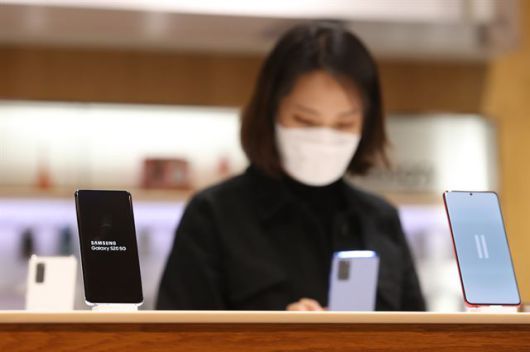Samsung regains top spot in Southeast Asian smartphone market in Q1: report
By YonhapPublished : June 17, 2020 - 15:31

Samsung Electronics Co. recaptured the top spot in the Southeast Asian smartphone market in the first quarter of the year by edging out its Chinese rivals, a report showed Wednesday.
Samsung's market share in Southeast Asia stood at 18.9 percent in the January-March period, according to market tracker Counterpoint Research, outperforming Chinese phone maker Oppo by 0.2 percentage point.
Chinese players also occupied the third to fifth spots on the list. Xiaomi came in third at 14.8 percent, followed by Vivo with 13.6 percent and Realme with 7.3 percent.
Samsung has been taking the top spot in the Southeast Asian market, but in the fourth quarter of last year, it was beaten by Oppo.
Counterpoint Research said that the rise in premium smartphones in the region is boding well for Samsung.
According to the market tracker, budget smartphones priced less than US$100 accounted for 27 percent of the Southeast Asian market in the first quarter, down from 46 percent a year ago.
In contrast, the portion of smartphones priced between $600 and $900 increased from 4 percent to 10 percent over the cited period.
Samsung has been trying to fend off challenges from Chinese phone makers expanding their presence with budget phones amid the novel coronavirus pandemic.
A recent Counterpoint Research report showed Chinese giant Huawei edged Samsung to become the world's largest smartphone vendor in April. According to its data, Huawei claimed 21.4 percent of the global smartphone market, beating Samsung's 19.1 percent share.
But in terms of the first-quarter result, Samsung still was the top smartphone supplier with an 18.5 percent share, which was higher than Huawei's 14.2 percent share.
Industry observers said the recent rise of Chinese phone makers is due to Beijing's relatively fast recovery from the virus pandemic as they mostly rely on the domestic market.
Samsung, on the other hand, took a heavier toll in recent months as its major markets like Europe suffered lockdowns. (Yonhap)







![[Graphic News] More Koreans say they plan long-distance trips this year](http://res.heraldm.com/phpwas/restmb_idxmake.php?idx=644&simg=/content/image/2024/04/17/20240417050828_0.gif&u=)
![[KH Explains] Hyundai's full hybrid edge to pay off amid slow transition to pure EVs](http://res.heraldm.com/phpwas/restmb_idxmake.php?idx=644&simg=/content/image/2024/04/18/20240418050645_0.jpg&u=20240419100350)






![[From the Scene] Monks, Buddhists hail return of remains of Buddhas](http://res.heraldm.com/phpwas/restmb_idxmake.php?idx=652&simg=/content/image/2024/04/19/20240419050617_0.jpg&u=20240419175937)

![[KH Explains] Hyundai's full hybrid edge to pay off amid slow transition to pure EVs](http://res.heraldm.com/phpwas/restmb_idxmake.php?idx=652&simg=/content/image/2024/04/18/20240418050645_0.jpg&u=20240419100350)

![[Today’s K-pop] Illit drops debut single remix](http://res.heraldm.com/phpwas/restmb_idxmake.php?idx=642&simg=/content/image/2024/04/19/20240419050612_0.jpg&u=)